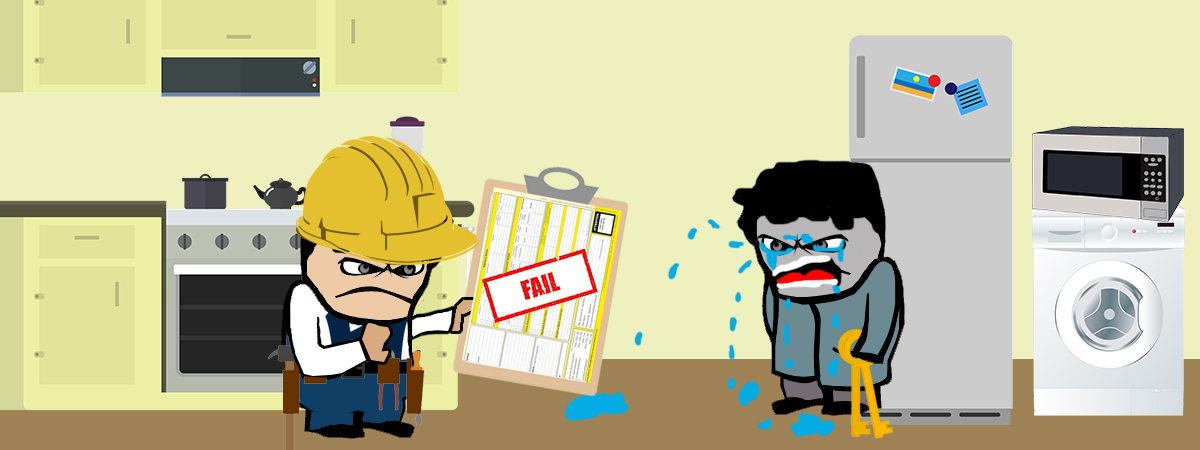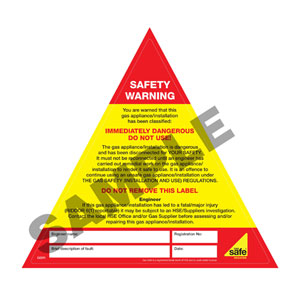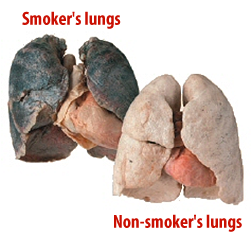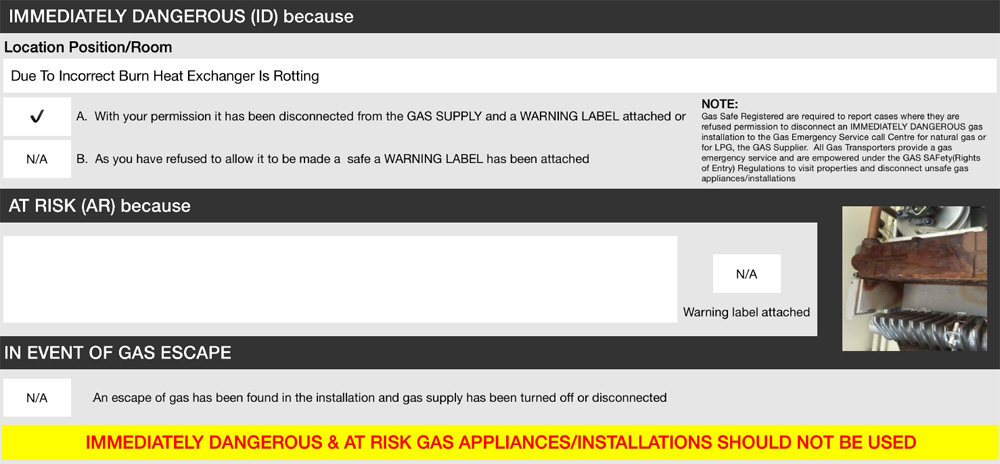
I’ve experienced some pretty nasty congealed crap travelling up and down my throat in my time, but nothing could have made my most recent mouth-full any easier to deal with.
I’d say a third of everything I consumed last week found its way crawling back up my throat after my plumber informed me the gas safe check had miserably failed because of a deteriorating boiler that was on the verge of entering the afterlife!
Signal… *deafening alarm bells*
Let’s face it, whenever a tradesman says anything is malfunctioning, that’s just their passive-aggressive away of saying “fuck you, it’s payday!”
It was the worst kind of gas safety failure too, a total code-red situation. The gas supply into the premises had to be terminated and the boiler had to be put down immediately like a rabid dog, and then stamped with a “useless piece of crap” caution sticker, which looked a little something like this:

There went my squeaky clean record; my first gas safety fail in several years of landlording. I had a good run, though.
If you’re in the market for a gas safety check, here are a list of my recommended Gas Safety Check/Certificate suppliers (all of which operate nationwide and make it easy to book online). Starting price £45.
Why did the safety check fail?
Take a look for yourself, the report is below, which includes an internal snap of the boiler’s decaying organs. The reason for failing should quickly become apparent…
The sheer horror :(
Anyone else proud owners of a failure certificate? Let’s huddle together and form a support group, because this feels like a dark and lonely place right now.
That boiler does not look healthy at all, right? ‘Ticking time-bomb’ comes to mind! I’m actually thankful no one was seriously injured, because that withering corpse looks like a hepatitis-infected death-trap that was ready to slay some bodies and bring the house down at any moment.
Do you know what it reminded me of? An image that went viral on Facebook a while back (you may have seen it if you’re down with the kids), that compared a set of healthy lungs with smokers’ lungs (a.k.a healthy boiler Vs my boiler).

If that doesn’t make you quit smoking (or change your shitty boiler), I don’t know what will!
As you can see from the report, the issue is classified as “IMMEDIATELY DANGEROUS” because the “Heat exchanger is rotting” – any bright spark care to elaborate? Apparently there was some kind of weak gas circulation, too- way below what’s required. It was all nonsense to me either way.
I was coherently told why and how it most likely occurred and what the severe consequences could be (something about the hot water tank potentially falling through the roof and scolding the living shit out of my tenant), but my heart was too busy falling out of my asshole to fully comprehend what was being mumbled; all I could think about was how much lighter my pockets were going to be after this episode. Typical landlord.
I have no idea how long the problem was bubbling away for, but it certainly didn’t happen overnight. I used a different plumber last year to undertake the check but he didn’t raise any red flags. Hmmmmm. The mind wonders… was he a fucking idiot?
In any case, I was given two options to resolve the matter:
- 1) Cheap/desirable option: replace the heat exchanger for approximately £300, while bearing in mind the boiler is 20+ years old and will almost certainly vomit a handful of other heart-stopping problems during the foreseeable future. However, with the cheese saved in the short term, it would allow me to purchase all kinds of useless and inadequate shit to reveal. I actually do need a new laptop.
- 2) Expensive/upsetting option: pay through the nose to replace the boiler with a spanking new power horse, and consequently struggle through life without a bitchin’ new laptop, which I absolutely
Clearly a no-brainer. Option 1 it is.
I kid. I kid.
Now, I have no idea if what my plumber guy was telling me was legit or not, the whole thing could have been a scam. However, I knew something looked wrong; I knew the safety check failed and I knew the boiler was approx 20yrs old and wasn’t worth spending a penny more on.
I opted for a new “Worcester Bosch 28 CDi”, which was a £2,200 kick in the nuts (including labour and a polish). Ouch!

Boiler Supply & Installation Comparison Websites
If you’re after a new boiler for a competitive rate, with the option of having it installed, then I can highly recommend trying on one of those swanky new ‘boiler comparison’ websites:
Some of you boiler-anoraks might be shrieking and raising your bushy caterpillar-monobrow at the amount I paid for parts & labour, so I want to clarify that the boiler wasn’t a like-for-like swap. The new Combi boiler replaced a conventional boiler, which involved getting rid of two water tanks and a cylinder. The deal also included 2 Gas Safety checks, and a couple of other uninteresting bits-and-bobs, which don’t deserve the air time to be explained.
Either way, I got a decent boiler out of it (allegedly one of the best, so I’m told. I also hear many good things about Valliant boilers). My investment should be a solid one, because I strongly believe in good quality boilers that provide reliability and longevity (it comes with a 7 year manufacturer’s warranty on the basis it gets an annual service and is installed by a Worcester Bosch accredited plumber, which it will and was).
Gas/heating issues are no joke, especially when it comes to BTL’s, and during winter periods when heat is a priority and every asshole plumber jacks their prices up while allegedly having a waiting list longer than my…
I’ll happily pay the premium for a solid boiler if it means avoiding that stab-me-in-the-eye situation.
Landlord Tip of the day: Skimp on everything else if you want; provide second-hand plastic toilet seats and the cheapest, nastiest shit-stained carpets you can get your grubby little mitts on while rummaging through your local skip… but invest in a decent boiler when the time comes; it will save you time, money and stress.
For those of you who have been avid readers for a while now (shout out to you guys, you are my inspiration and I’m truly humbled by your ability to tolerate my drivelling nonsense), you may remember I went through a similar experience several months ago, where I almost slipped into cardiac arrest and keeled over like a sack of potatoes when I went through an almighty shit-mare involving escalating and unforeseen maintenance and repair costs.
The kitchen, oven and boiler all toppled over like dominoes in the same property during the same month. I installed the same replacement boiler back then, too. The entire ordeal hacked away a whooping 7k from my contingency pot. Urgh!
It’s been an expensive year to say the least.
What should you do if your gas safety check fails?
Resolve the issue(s) responsible for the fail ASAP.
It’s really that simple as far as I’m concerned.
I can’t fathom why so many landlords (I hear many reports) don’t attend to gas/heating issues immediately. It blows my mind because there really isn’t an upside to delaying the inevitable, and it ultimately shows total disdain towards tenants (which is potentially another expensive mistake). I don’t expect all landlords to buy the best or most expensive solutions, but at the very least provide a safe and comfortable environment, even if that means making extra effort and/or sacrifices to achieve it.
According to the Gas Safe website, it’s the landlords legal obligation to do the following…
If you let a property equipped with gas appliances you have three main responsibilities:
- Maintenance: pipework, appliances and chimney/flues need to be maintained safely. Gas appliances should be serviced in accordance with the frequency given in the manufacturer’s instructions. If these are not available, you should ask a Gas Safe registered engineer to service them annually.
- Gas safety checks: An annual gas safety check should be carried out on each gas appliance/flue. This will ensure gas appliances and fittings are safe to use. There is a legal requirement on you to have all gas appliances safety checked by a registered engineer annually and you also need to maintain gas pipework and flues in a safe condition. This is UK law.
- Record: A record of the annual gas safety check should be provided to your existing tenants within 28 days of completion, or to new tenants upon the start of their tenancy. If the rental period is less than 28 days at a time you may display a copy of the record in a prominent position within the dwelling. You’ll need to keep copies of the record for at least 2 years.
I suspect there is a little confusion about the gas safety check, in respect to what happens if it fails and what timescales landlords have to work with. From my understanding, the legislation states that a safety check must be done annually, and the time between the checks should not exceed longer than 12 months. However, if any problems are flagged during a check they do not need to be resolved within the 12 months from the previous check, but must be attended to in a ‘reasonable’ time frame. At this point, Section 11 of Landlord and Tenant Act 1985 (ZzzzZZZzz) kicks in, which states:
to keep in repair and proper working order the installations in the dwelling-house for the supply of water, gas and electricity and for sanitation (including basins, sinks, baths and sanitary conveniences, but not other fixtures, fittings and appliances for making use of the supply of water, gas or electricity)
How long do landlords have to fix gas safety issues? Quicker the better… (that’s what she said!)
The guidelines/regulations don’t specify exactly how quickly landlords need to react to safety failures (i.e. there isn’t a number of days specified), but it’s safe to assume that within ‘reasonable’ time is a given, which will vary depending on the circumstances.
However, if there’s one thing that landlords should act quickly on, it’s gas/heating issues, especially if they pose potential risks. Common sense if you ask me.
If landlords are found guilty of being neglectful or bone-idle when the time calls, they could face heavy penalties, especially with charities like Shelter aggressively campaigning against rogue landlords, and making it so damn compelling and easy for tenants to prosecute. Hell, they make me want to sue myself!
In my case, once the boiler was diagnosed as a dangerous and useless piece of prehistoric turd, I had a replacement fitted within 6 days, and then commissioned another safety inspection (which, thankfully, passed with flying colours).
I personally move quickly when it comes to gas/heating issues because the potential consequences scare the living shit out of me. I can’t have problems like that hanging over my melon for too long before I’m a hopeless nervous wreck.
Being utterly inconvenienced aside, I think my tenant genuinely appreciated how seriously I took the matter and how quickly I reacted. The compounding effects of providing a good service (i.e. showing you actually give a flying shit) is a ‘value’ all landlords should recognise and continually achieve, because it DOES equate to good business (i.e. more profit achieved by lower tenant turnover). Obviously, the fact someone’s life is potentially in danger should be reason enough, but clearly it isn’t for many landlords, so that’s why the “profit” angle might be more compelling. Sigh. I think landlords often forget that tenants are paying for a service.
I didn’t show any obvious signs of hesitation when I was told what needed to be paid to resolve the situation (she stood next to her man (me) when the plumber broke the devastating news). She’ll remember that. Of course, inside I was an emotional mess and at the brink of passing out; I wanted to vomit all over Jamie Oliver’s glossy smug face, which was wrapped around his latest recipe book, situated on the kitchen worktop. I 100% made the right choice nonetheless.
I’m now officially £2,200 poorer, which means I’ll probably have to put my colon and rectum through living hell for the next few months as I’ll be forced to reunite with my cost-effective University dietary plan, which consisted of pot-noodles and leftovers (thanks to the remarkably easy access to the bins behind the local kebab-house).
However, knowing I’ll have your support (as always) and comforting words (leave a comment, especially if you’re a lurker and never engaged before) is what keeps me fighting another day.
What’s your experience?
Anyone else had any disastrous (or even utterly mundane) reasons for a gas safety check failing?
Oooh, and agents, have you encountered any landlords that have been reluctant or completely against resolving problems flagged by a gas safety check? What happened? Tell me how ugly they were! I imagine it’s a common scenario; landlords are generally among the cheapest assholes on the planet, while hopelessly lacking empathy. Yes, we are.
On a final note, winter is coming, so if you’re aware of any gas/heating issues that’s ‘legally’ hanging on by a thread, I’d get that resolved now.
Disclaimer: I'm just a landlord blogger; I'm 100% not qualified to give legal or financial advice. I'm a doofus. Any information I share is my unqualified opinion, and should never be construed as professional legal or financial advice. You should definitely get advice from a qualified professional for any legal or financial matters. For more information, please read my full disclaimer.


 Landlord Products / Services
Landlord Products / Services




























Sorry to hear of your troubles
I live in South Africa and hot water geysers/boilers are covered by your homeowners insurance policy (the same one that does NOT cover you if you go on holiday and when you come home the local population have stolen your house brick by brick, door by door and roof tile by roof tile leaving only the foundations) so boiler repairs cost you the insurance excess of about 30 UK pounds. My next question is how the heat exchanger "rotted", I installed a Junkers (yes the same chaps responsible for the Stuka etc. etc.) gas boiler for my home myself about 35 years ago ("gas safe" plumbers in South Africa kill about the same number of people here as they do in the UK mostly through carbon monoxide poisoning but with the odd explosion mixed in for fun). As I am an engineer I installed mine outdoors - no risk of either explosion or co poisoning but you have to re-light it occasionally as the wind extinguishes the pilot light.
The Junkers has a copper alloy heat exchanger that takes about 100 years to corrode unless your water so acidic/alkaline you cannot drink it. I cannot see a UK manufactured boiler being a much poorer design than a German one so are you sure the burners were not adjusted incorrectly allowing carbon to build up on the heat exchanger causing poor or incomplete combustion, more carbon build up and co? A faulty heat exchanger (rotten) would spray water everywhere as it not functions like a car radiator in reverse (absorbing heat rather than dissipating it) but is under pressure. Did the plumber rub the exchanger and show you it was covered in black sh!t? Then tell you the co levels were too high?
If he did and that's how it looks from the picture I am afraid "you've been had lad"
The correct procedure is to adjust for a "lean" gas mixture, burn the carbon off then adjust the gas mixture to the correct level, excess carbon may be blown off with a blower.
One other nice thing about South Africa is you only need gas safety compliance, electrical compliance, electrified fence compliance and termite compliance certificates when you sell a house and an MOT only when a car changes hands. Its a hang over from the apartheid government which assumed everyone was a "reasonable man" and not a complete idiot who needed to hold nannys hand.